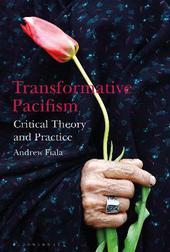
|
Transformative Pacifism: Critical Theory and Practice
Hardback
Main Details
| Title |
Transformative Pacifism: Critical Theory and Practice
|
| Authors and Contributors |
By (author) Andrew Fiala
|
| Physical Properties |
| Format:Hardback | | Pages:272 | | Dimensions(mm): Height 234,Width 156 |
|
| Category/Genre | Ethics and moral philosophy
Social and political philosophy |
|---|
| ISBN/Barcode |
9781350039209
|
| Classifications | Dewey:172.42 |
|---|
| Audience | | Tertiary Education (US: College) | |
|---|
|
Publishing Details |
| Publisher |
Bloomsbury Publishing PLC
|
| Imprint |
Bloomsbury Academic
|
| Publication Date |
23 August 2018 |
| Publication Country |
United Kingdom
|
Description
Defending pacifism against the charge that it is naively utopian, Transformative Pacifism offers a critical theory of the existing world order, and points in the direction of concrete ethical and political action. Pacifism is a transformative philosophy with wide ranging implications. It aims to transform political, social, and psychological structures. Its focus is deep and wide. It is similar to other transformative social theories: feminism, ecology, animal welfare, cosmopolitanism, human rights theory. Indeed, behind those theories is often the pacifist idea that violence, power, and domination are wrong. Pacifist theory raises consciousness about unjustifiable violence. This in turn leads to transformations in practical life. Many other books defend nonviolence and pacifism by focusing on failed justifications of war, as well as on the strategic value of nonviolence. This book begins by reviewing and accepting those sort of arguments. It then focuses on what a commitment to pacifism and nonviolence means in terms of a variety of practical issues. Pacifists reject the violent presuppositions of a society based upon power, strength, nationalism, and the system of militarized nation-states. Pacifism transforms psychological, social, political, and economic life. This book will be of interest to those who are disenchanted with ongoing violence, violent rhetoric, terrorism, wars, and the war industry. It gives anyone with pacifist sympathies reassurance: pacifists are not wrong to think that violence and war are immoral, irrational, and insane and that there is always an alternative.
Author Biography
Andrew Fiala is Professor of Philosophy at California State University, Fresno, USA. He is the author of The Just War Myth (2008), The Philosopher's Voice (2002) and Practical Pacifism (2004), and editor of the Bloomsbury Companion to Political Philosophy (2015).
ReviewsAs thoughtful and thought-provoking as it is informed and informative, 'Transformative Pacifism: Critical Theory and Practice' is an exceptionally well written, organized and presented study that is especially and unreservedly recommended addition to community, college, and university library Contemporary Philosophy collections and supplemental studies reading lists. * Midwest Book Review * Original in conception, vast in scope and lucid in presentation, Andrew Fiala's book represents a fresh approach to moral philosophy as well as making a major contribution to understanding world peace. * Robert L. Holmes, Emeritus Professor of Philosophy, University of Rochester, USA * Transformative Pacifism provides a holistic discussion of pacifism as a comprehensive normative theory and critical social theory. The book persuasively assesses and supports the relevance and importance of pacifism as a distinctive ethical and political position at multiple levels, from the personal to the global. This book will be an important resource for those interested in a wide range of issues associated with peace studies, nonviolence studies, and political theory more generally. * Iain Atack, Assistant Professor in International Peace Studies, Trinity College Dublin, Ireland * Andrew Fiala has been a major voice in the growing interest in pacifism and non-violence in recent years. People look to him for informed, insightful, and committed writings on the major question of our time: how can we move beyond the violence that infuses so many dimensions of our world-and create the world of peace for which humanity has longed? His latest book, Transformative Pacifism, is another vital contribution to these discussions. He develops an expansive conception of pacifism as a philosophy of life in all its dimensions, and in all its relations to the world including the natural world. He is not just concerned with opposing war, but asks: What does it mean to practice peace? His book is written in a style accessible to students and scholars alike. It is a book that can, and should, be read by all. I recommend it in the highest terms. * Cheyney Ryan, Director of Human Rights Programs, Institute for Ethics, Law, and Armed Conflict, University of Oxford, UK * Fiala's book is an excellent presentation of pacifism as moral and critical theory. * Ethical Perspectives *
|